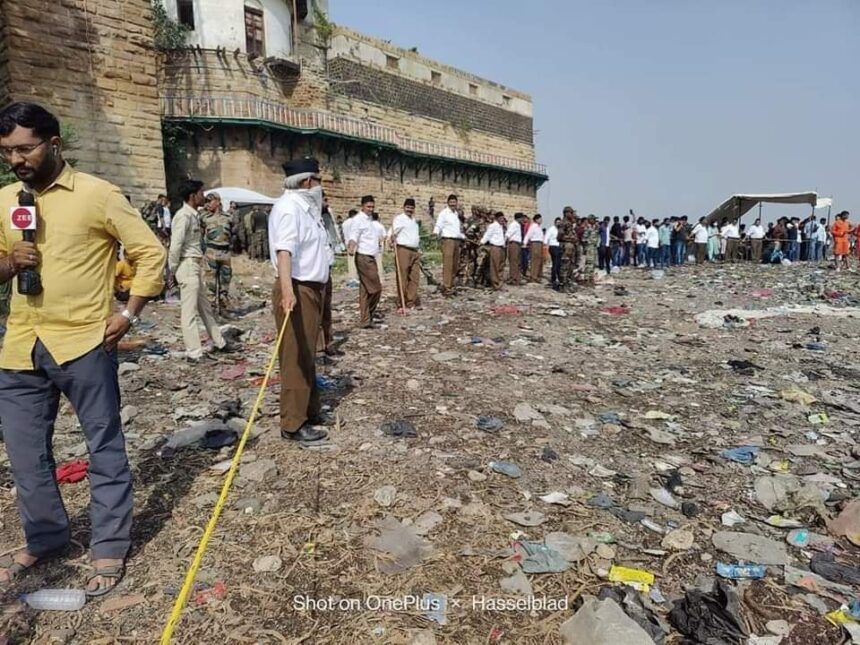Social Metamorphosis: From Values to Culture
Part 6: RSS Centenary Sankalp Blog Series
🇮🇳/🇬🇧
Introduction
“Drop by drop, the ocean is filled.” This timeless saying captures the essence of the fourth goal of the RSS Centenary Declaration—Social Metamorphosis. Adopted in Bengaluru in 2025, the resolution emphasizes not just political or economic change, but a holistic transformation that touches every layer of society. Its vision is clear: to build a strong national life balanced between material prosperity and spiritual depth.
The Philosophy of Social Metamorphosis
At its heart, social metamorphosis begins with the transformation of the individual, extends to the family, and culminates in the community. An individual rooted in values inspires the family, and value-oriented families together nurture communities bound by harmony. This ripple effect builds a society that is cohesive, confident, and prepared to contribute to universal welfare.
Education as the First Axis
Education is not merely a means of earning; it is a process of shaping character and culture. The centenary declaration reminds us that India possesses experiential knowledge rooted in its traditions that can contribute to a harmonious world. Integrating this into the education system requires more than adding content—it calls for reshaping priorities. Character formation, indigenous knowledge systems, and value-driven curricula must stand alongside professional skills. This alignment transforms classrooms into spaces where future citizens develop confidence anchored in dharma and responsibility.
Culture as a Unifying Force
Culture is the living spirit of society. Social metamorphosis envisions a cultural life that deepens festivals with spirituality, revives artistic expressions with national consciousness, and encourages languages rooted in heritage. At its core lies the idea of harmony: protecting humanity from divisive tendencies and reinforcing the sense of unity across creation. When culture thrives in this way, it becomes a binding force, offering resilience against fragmentation.
Economy with Responsibility
A society cannot sustain itself without economic strength. Yet the declaration stresses that prosperity must be matched with responsibility. Social metamorphosis here means promoting indigenous production, strengthening rural economies, encouraging cooperative ventures, and advancing industries in ways that remain eco-friendly. This economic vision goes beyond growth metrics—it seeks prosperity that uplifts communities and respects the environment.
Women and Youth as Pillars
The transformation of society requires full participation. Women are recognized as custodians of values within families and contributors to education, culture, and public service. Their role is not supplementary but central. Similarly, the youth carry the responsibility of preparing for future challenges. With the right balance of skills and values, they become agents of both national pride and global vision.
Technology and the Global Dimension
Modern challenges demand modern tools. Digital platforms, AI, and social networks, when aligned with cultural values, can extend the reach of social metamorphosis. They not only preserve traditions but also bring communities together across geographies. The Hindu diaspora, active in cultural celebrations, language teaching, and service projects abroad, strengthens Bharat’s civilizational message globally and feeds back into its social transformation.
Practical Pathways and Illustrations
Social metamorphosis is not abstract. It is visible in cleanliness campaigns led by volunteers, in women’s cooperatives that combine livelihood with dignity, and in temple-based ecological projects that connect tradition with modern sustainability. These practical efforts show how values can become culture, and culture can become collective strength.
The Outcome: From Individual to the World
When individuals refine themselves, families embody values, and communities live in harmony, a new society takes shape. This is the vision of Social Metamorphosis: From Values to Culture—a society that not only resolves its internal challenges but also contributes to the welfare of the world.
The centenary declaration calls for such a transformation—one where social unity, ecological responsibility, economic justice, and cultural revival work together to build a cohesive national life. In this way, Bharat can stand as an example before the world, making the ancient prayer “Sarve Bhavantu Sukhinah”—may all be happy—not just an aspiration but a lived reality.
Feature Image: Click here to view the image.
Video
Glossary of Terms
-
RSS Centenary Declaration (2025): A resolution adopted in Bengaluru outlining five major goals for the next century of the Rashtriya Swayamsevak Sangh (RSS).
-
Social Metamorphosis: A holistic transformation of society envisioned by the RSS centenary goals, extending from individuals and families to communities, economy, and culture.
-
Dharma: A Sanskrit term signifying righteous living, moral duty, and cultural values—seen here as the foundation for personal and social renewal.
-
Experiential Knowledge: Knowledge acquired through lived cultural and civilizational practices, emphasized as part of India’s contribution to global harmony.
-
Samrasata (Harmony): The principle of rejecting caste, regional, and linguistic divisions to create social unity and equality.
-
Sarve Bhavantu Sukhinah: A Sanskrit prayer meaning “May all be happy,” cited as the ultimate goal of social metamorphosis.
-
Indigenous Production: Locally rooted methods of manufacturing and trade that strengthen community self-reliance and reduce dependency on globalized systems.
-
Eco-Friendly Industrialization: The practice of balancing economic development with environmental responsibility, ensuring growth without ecological harm.
-
Global Hindu Diaspora: Hindus living outside India who contribute to cultural preservation, community service, and social transformation abroad, reinforcing Bharat’s message globally.
-
Temple-Based Ecological Projects: Community-led sustainability efforts—such as river protection, reforestation, or plastic-free campaigns—anchored around temples and cultural centers.
-
Women’s Cooperatives: Community organizations led by women to promote self-reliance, livelihood, and value-based education within families and society.
#Society #Culture #Values #Change #HinduinfoPedia
Previous Blogs of the Series
- https://hinduinfopedia.org/sarve-bhavantu-sukhinah-the-spiritual-foundation-of-rss-philosophy/
- https://hinduinfopedia.org/striving-for-character-excellence-enhancing-shakha-quality/
Related Blogs
- https://hinduinfopedia.org/rashtriya-swayamsevak-sangh-a-pillar-in-modern-hindu-society/
- https://hinduinfopedia.org/sanatana-dharma-secular-and-inclusive-values-of-hindu-philosophy/
- https://hinduinfopedia.in/nathuram-godse-murderer-patriot-or-fractured-youth/
- https://hinduinfopedia.org/ambedkars-buddhist-political-move-divergence-from-gandhi-on-caste-issues/
- https://hinduinfopedia.org/india-china-border-tensions-a-strategic-analysis/
- https://hinduinfopedia.in/gandhis-murder-was-nehru-involved/
- https://hinduinfopedia.in/waqf-act-debate/
- https://hinduinfopedia.com/abrahamic-religions-alliance-how-global-networks-target-indias-democracy/#Modi_the_RSS_and_the_Abrahamic_Narrative_Trap



Leave a Reply